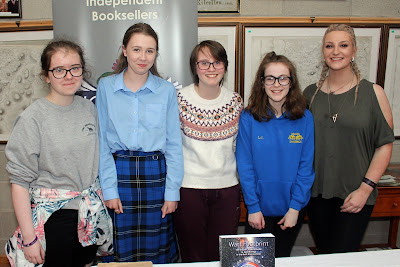Small things make big energy differences — KSEC meeting
 |
| Ray Kelly, KCA; Paul O'Reilly, energy consultant; Barry Griffiths, Kildare Co Council; John Harrington, energy consultant; and Padraig Maloney, KCA. |
From that, it was then clear that it is best that individuals and communities take control of their environment to achieve these small improvements which will later allow them to take on bigger ones.
But first, we have to know where we are, so that we can see where we get to on the road to a smaller energy footprint.
"What you can't measure, you can't manage," energy consultant Paul O'Reilly told the clearly engaged audience who turned up for the event in the Town Hall. For homeowners and businesses alike, a simple investment of as little as €45 in a real-time energy monitor is a good first step, he said.
 |
| Paul O'Reilly, energy matters author; with Saoirse Behan of Woodbine Books. |
He spoke of the savings that can be made by simply replacing older bulbs with more efficient types, even if they are significantly more expensive. "Remember, that it isn't just a case of the wattage, there is the time element also, that a bulb is in use." Noting that there are 8,700 hours in a year, changing a bulb from a 90W incandescent to a 12W LED can make a significant difference in running costs while it is on.
Lights were also one of the examples of power saving on a corporate level as detailed by Barry Griffiths (above), Facilities Manager with Kildare County Council. Speaking on the current programme to improve energy efficiency at the Council's headquarters in Naas, he said that replacing with more efficient bulbs in areas which are most in use realised substantial savings very quickly. "We also replaced 150 lighting controls that had broken down, and in all our outdoor areas we put in passive switches which turn off lights five minutes after people have gone through."
An 'Energy Day', to advise staff in the building on simple ways of saving energy also helped. "Turning off computers at night, turning off radiators instead of opening windows when it gets too hot, putting timers on the Burco boilers in the coffee bays so that they're not on all night ..."
Such measures have already made enough difference that in 2017 the Facilities section was able to hand back €80,000 of its previously estimated budge for running a building with up to 500 staff. In the next phase of the programme, solar panels are being installed, which will provide about 15pc of the total energy use in the building. "The total cost of that will be recovered in five years."
For the ordinary homeowner, he said similar savings could be achieved. "It's just walking around your house with your eyes open. Turn your lights off when you don't need them. Turn your TV off. It is pointless doing the big things unless you do the little things first."
 |
| Padraig Maloney, KCA; Paul Harrington, Future Fit; and Derry McKeown, Kilsaran. |
Noting that 'a huge amount' of energy is wasted in the residential sector, which means the wastage is highly dispersed, he said the country needs to figure out 'how to save small amounts of energy in everybody's home'. "It's the smart thing to do as well as the nice thing to do."
He provided information on some of the grant aids available to homes, business, farms, public buildings and schools for energy conservation. He also said that a community which took on the responsibility of producing an 'energy master plan' in partnership with the SEAI could get a 'VIP Pass' to funding.
"I see the process as a continuum, from the simple things all the way to the big projects like deep retrofits. And it can also earn extra points in the Tidy Towns competition."
The final section of the meeting dealt with a variety of individual questions on matters ranging from electric vehicles to insulation and upgrading energy systems. Padraig Maloney and Ray Kelly of Kilcullen Community Action outlined how the Kilcullen SEC group is 'still at the very early stage' and 'learning as we go along'.
"We needs the clubs and organisations to come to us with their needs for saving energy, and we'll sit with you and help you out," Ray said, while Padraig expects that a draft energy master plan will be developed over the next three months.
In addition to individuals and community and business representatives from Kilcullen, last night's meeting also attracted interest from people in other parts of Kildare and from as far as Kilkenny.
 |
| Barry Griffiths, KCC; Robert Moran, Facilities Manager, Kerry Group; Padraig Maloney, KCA; and Eoin Houlihan, KCA. |
Kilcullen Diary Policy on Photographs.


































